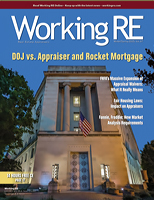 |
> The Appraiser Coach > AMC Resource Guide > OREP E&O |
Fair Housing Laws and Their Impact on Real Estate Appraisers
by Jo Traut, McKissock Learning
Fair housing laws play a pivotal role in ensuring equal access to housing and in preventing discrimination in real estate transactions. For you, as an appraiser, understanding and complying with these laws is essential to conducting ethical, objective, and fair appraisals. This article examines key fair housing laws and their implications for your appraisal practice.
By embracing the principles of fair housing, you not only contribute to the integrity of the real estate market but also to the broader goal of fostering inclusive communities where everyone has the opportunity to thrive.
Key Fair Housing Laws
The primary federal laws governing fair housing include:
- The Fair Housing Act (FHA) of 1968: Prohibits discrimination in housing based on race, color, national origin, religion, sex, familial status, and disability.
- The Equal Credit Opportunity Act (ECOA) of 1974: Prohibits discrimination in lending based on race, color, religion, national origin, sex, marital status, age, receipt of public assistance income, or exercise of rights under consumer protection laws.
- The Civil Rights Act of 1866: Prohibits racial discrimination in property transactions.
In addition, many states and municipalities have their own fair housing laws that may provide broader protection.
Impact on You as an Appraiser
These laws impact you in several ways:
- You must not base your opinions of value on protected characteristics such as race, religion, sex, etc. This applies to both the subject property and the identification of the subject property’s competitive market area.
- You need to be aware of possible unconscious biases and take steps to ensure objective, unbiased valuations. While unconscious biases exist in all professions, you have a responsibility to acknowledge and mitigate these biases to ensure unbiased valuations.
- When describing neighborhoods, avoid references to protected characteristics of residents or subjective qualifiers such as the terms “desirable,” “family-oriented,” and “inferior.” Your appraisal reports must be free of potentially discriminatory language or stereotypes.
- The choice of comparable properties must not be influenced by discriminatory factors. You are required to ensure that your selection is based purely on objective criteria. This practice helps mitigate any conscious or unconscious bias. Including a diverse range of comparables that reflect the market conditions and relevant characteristics of the subject property is essential.
- Use reliable, non-discriminatory data sources. This means selecting data from reputable sources that provide comprehensive and objective market analyses. In practice, this involves choosing data tools and technology that clearly outline their selection criteria and methods, thereby avoiding any potential bias.
(story continues below)
(story continues)
Compliance Strategies
To ensure compliance with fair housing laws, you can:
- Stay informed about fair housing laws and best practices. Regular training and education aren’t just requirements; they are also opportunities to enhance your professional skills and ensure that your appraisals align with current fair housing standards. Seek out workshops, webinars, and industry publications to keep your knowledge current.
- Develop and adhere to a robust, objective, and consistent valuation methodology and inspection process. A well-defined process helps ensure consistency across all appraisals, regardless of property location or occupant characteristics. This approach not only fosters fairness but also strengthens the credibility of your work.
- Maintain detailed records in your workfile that include your decision-making process. Clear, comprehensive documentation serves as a valuable reference and demonstrates the objectivity of your appraisals. Include your reasoning for comparable selection, adjustments, and other key decisions in your reports.
- When selecting comparable properties, cast a wide net. Consider a range of properties that truly represent the subject property and its market. Don’t necessarily limit yourself to three comparable sales. Sometimes, including competitive older and distant sales provide additional support for your opinion of value for the subject property—this approach ensures a more defensible valuation.
- Rely on objective, measurable data to support your conclusions as much as possible. While qualitative factors have their place, quantitative data provides a solid foundation and helps mitigate potential bias concerns.
- Implement a robust quality control process. Use your software’s automated quality control tools, and if feasible, have a colleague or assistant review your appraisal report before submitting it to your client.
Consequences of Violations
Violations of fair housing laws can result in violators receiving serious repercussions, including:
- Disciplinary actions by state licensing boards, potentially resulting in the revocation of licenses
- Exposure to civil lawsuits and substantial financial penalties
- Loss of certification from professional appraisal organizations
- Significant damage to an appraiser’s professional reputation
Conclusion
Fair housing laws serve a vital role in promoting equitable access to housing and credit. By understanding these laws and implementing robust and consistent compliance practices, you can conduct fair, objective valuations that uphold the principles of equal treatment while also mitigating potential liability. As the housing and lending industry continues to grapple with issues of bias and discrimination, a thorough grounding in fair housing requirements is more important than ever for real estate appraisal professionals.
About the Author
Jo Traut is a certified residential appraiser with more than 27 years of experience, licensed in Illinois and Wisconsin. Jo specializes in appraising luxury homes, valuations for lending purposes, relocation appraisals, appraisal review, and appraisal compliance. Jo previously served as SVP, Residential Chief Appraiser for the fifth-largest bank in the United States. She currently serves as Director of Appraiser Training at McKissock Learning. Jo holds a CDEI designation from IDECC and is an AQB Certified USPAP Instructor, combining her extensive professional knowledge with a commitment to appraisal education.
OREP Insurance Services, LLC. Calif. License #0K99465




by Gary
In 46 years. 40000+ invoiced files. I have never observed any of outcomes you so cautiously articulate. A solution in search of a problem? Read Mr. Baggots columns.
-